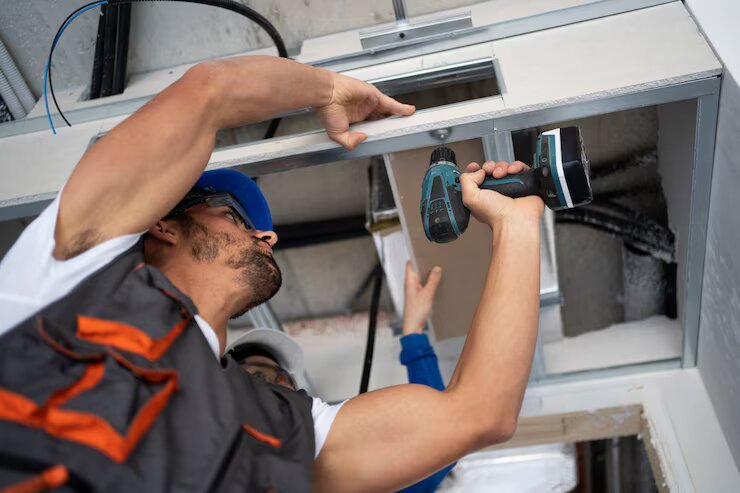Garage doors can have many problems. If your garage door is making a lot of noise, and garage door opener not working or appearing uneven there’s likely something you can do to fix it.
If your garage door is having problems, here are some common solutions and indications of when to contact an expert for assistance.
Garage Door Opener Failed
Garage Door Close-Force Screw Needs Adjustment
If a garage door reverses before it has even touched the floor, the problem could be related to the screw that adjusts the garage door.
Garage door openers have an adjustment screw that controls the closing force, which is the amount of pressure the door can apply before the motor shuts off. If the door reverses before touching the floor, it’s typically because the closing force setting needs adjustment.
The friction of the rollers in the tracks may trick the door opener into believing the door has already reached the floor. This means the opener must be adjusted to reduce its sensitivity.
If the garage door suddenly rises after it touches the floor, this could also be due to a close-limit switch issue. Gradually adjust the screw on the motor until the door stops moving once it reaches the floor.
Garage Door Opener Motor Needs Replacement
If the garage door doesn’t open, the opener’s motor may have failed and stopped working entirely. You can either replace the motor yourself or contact an expert to do the replacement.
Garage Door Springs Need Adjustment or Replacement
When the garage door doesn’t open, the issue may lie with the extension or torsion springs. The torsion spring is above the garage door opening, while the extension springs are on the sides of the door.
Torsion springs are difficult and risky to replace, so it’s recommended to hire an expert garage door technician for the task. Replacing extension springs, however, is less complex and typically costs between $40 and $120. Most large home improvement stores carry replacement extension springs.
Garage Door Cable Has Snapped
Garage door springs work together with cables to lift the door safely. Sometimes, the cables snap or sag.
The garage door might still open despite the snapped cable, but operating it in this condition is unsafe. Contact a garage door service to have the cable repaired.
Garage Door Is Off Track
If your garage door isn’t opening, the most likely reason could be that the door is off the track or not correctly aligned due to loose tracks. Slow or uneven door movement, squeaking, or unusual sounds might indicate this issue. Also, ensure that the weather seals or strips aren’t slipping off or snagging on the track.
To fix an off-track garage door, remove the screws holding the frame to the track. Use a piece of wood or a rubber mallet to tap the track back into place gently. Then, tighten the screws securely.

Blocked Sensors
If you’re having trouble closing or opening your garage door, it may be due to blocked or covered sensors.
To ensure your remote and garage door operate properly, check for any obstructions that might block signals.
If you’re using a remote, ensure no trees or branches interfere with its operation. Also, inspect the antenna for dust or buildup that could block the signal. Sometimes, the antenna may shift out of alignment. A simple fix is to adjust it back into position.
Get New Springs
The springs in your garage door system will likely wear out after several cycles, which may cause them to break. Keep the lifespan of your springs in mind and consult an expert to replace them when necessary.
If your springs fail during use, the door could slam down, damaging your vehicle or injuring someone. If the springs snap even when not in use, do not attempt to open the garage door. The system may cause the broken springs to act as projectiles, leading to serious injury.
Refresh or Replace
Worn or damaged rollers can cause issues when opening your doors. The first step is to lubricate the rollers. If they still cause problems, you might need to replace them.
Rollers are typically used until they reach their maximum cycle limit. Be aware of when your rollers are nearing the end of their limit so you can replace them promptly.
Dying Opener
Garage door openers allow you to use your garage efficiently whenever you need it. If your door opener is twenty years old or older, it has likely surpassed its useful life.
Try troubleshooting your garage door opener by checking the batteries, moving closer to the garage, and clearing the path for the antenna.
If you’re experiencing issues, it is most likely due to a failing motor. An aging or overheated motor will not respond as it should.
Always hire a professional to install a garage door opener to avoid injury or damage to the door.
Unusual Noises
A series of strange noises may indicate an underlying issue. Some could be minor, while others require immediate professional attention.
Your door can generate a variety of noises depending on the problem. Common issues and their associated sounds include:
- Loose chains: Slapping
- Loose rollers: Grinding, squealing
- Loose locks and nuts: Vibrating or rattling
- Rust: Knuckling
- Broken springs: Popping and rattling
- Misalignment: Squeezing, rubbing, scraping
If you’re unsure about the source of the noise or its cause, consult a professional for garage door troubleshooting.
Uneven Door
Sometimes, your door may appear misaligned or move unevenly. If this happens, there are several areas to check.
Something obstructing its path can cause a door to be unlevel. Ensure all obstructions are cleared.
Rust may cause one part of the door to move differently than the other. A quick wipe-down may resolve this issue.
Refer to your manual to verify that all settings are correctly adjusted. Ensure that the door closes fully and operates without malfunctions.
If the issue lies in the spring system, consult an expert and minimize door usage. Snapped springs can be dangerous and may cause serious injuries.
Transmitter Problems
Your remote is supposed to open the garage door easily, but that’s not always the case.
The solution to your transmitter issues is usually as simple as changing the battery.
First, check the transmitter in your garage to identify the source of the problem. If the door doesn’t open, there’s likely a root issue. If it does open, the batteries may be dead.
Changing the batteries typically involves removing the device’s rear cover (in some cases, using a screwdriver). If the remote still doesn’t work, always ensure the batteries are facing the correct direction to avoid assuming the issue lies elsewhere.
Keypad Not Synced
Garage keypads provide peace of mind and security for many homeowners. The keypad is probably not synced if your garage door doesn’t open when you input your password.
Syncing your keypad is an easy fix that can be done in just a few minutes.
Start by checking the batteries. They might be dead, so they need to be replaced immediately.
Next, consult the user manual for instructions on properly syncing the remote and keypad. If the issue persists, contact the manufacturer for further assistance.
Garage Door Remote or Keypad Not Working Properly
The wireless remote control or mounted keypad may have stopped working if the garage door isn’t opening.
- Remote control battery or antenna: If the door opens using the hardwired wall switch, the remote control battery may need to be replaced. If the battery seems fine, ensure the motor’s antenna wire hangs down and is undamaged.
- Reset the remote control: The remote or keypad may need reprogramming. Sensitive electronics can lose synchronization and require a reset. Every garage door opener has a specific reprogramming process, so refer to the instructions or look online for guidance specific to your brand.
- Check the lock: Inspect the garage door from inside the garage to confirm no one has physically locked it from the inside.
FAQ
What caused the garage door opener to abruptly stop working?
- Cause #1: Dead Remote Batteries
- The batteries in your garage door opener’s remote can deplete over time (usually around two years) and may need replacement. If your garage door doesn’t open when you press the remote, the batteries could die.
- Solution: Replace the remote’s batteries and test it again.
Why is my garage door not responding to the remote?
A garage door opener remote may stop working due to:
- Dead batteries.
- Interference from other radio devices.
- A power outage.
- There is a problem with the opener’s logic board.
- A worn-out remote.
TIP: Locate the “Learn” button on your garage door opener’s control panel and hold it for 30 seconds to reset.
How do I reset my garage door opener?
Best Options for Resetting Your Garage Door Opener Code:
- Press the “Learn” button.
- Enter the new code.
- You’re done!
If you’re resetting the remote:
- Press the “Learn” button for 10 seconds to erase the existing code.
- Press the “Learn” button again.
- Press the button on the remote.
- Your remote is now reset!
Why is my garage door not responding when I press the wall-mounted button?
The issue could be due to:
- Low remote batteries.
- Interference from other radio devices.
- A power outage.
- A malfunctioning logic board in the opener.
- A worn-out remote or device.
TIP: Locate the “Learn” button on your garage door opener’s control panel and hold it for 30 seconds to reset.


